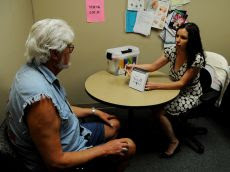
From Washington state to the Sturgis Motorcycle Rally in South Dakota, Yuman Joseph Boze likes to travel.
But his plans were put on hold after he suffered a stroke in March 2008.
Now Boze has been diagnosed with aphasia, a disorder that affects people's communication skills.
Corinna Atchly, a speech language pathologist with Yuma Rehab, said there are two types of aphasia: receptive and expressive.
Receptive, she said, affects a patient's ability to understand and make sense of what he or she reads, hears or sees. Patients with expressive aphasia, she said, have difficulty verbalizing wants and needs, have trouble writing or making gestures. Next..
Sunday, July 19, 2009
Coping with aphasia
Posted by iRDMuni at 3:00 PM 0 comments
Friday, July 17, 2009
Easier word processing for someone with aphasia
Jack Schofield, the technology expert at The Guardian was asked about alternatives to using Open Office's predictive text for someone who has acquired asphasia after having a stroke.
There are several programs that are designed for people with physical impairments or severe dyslexia that should be more useful than Open Office's predictive text or Microsoft Office's AutoComplete.NEXT...
Posted by iRDMuni at 1:37 PM 0 comments
Aphasia and text writing.
Background: Good writing skills are needed in almost every aspect of life today, and there is a growing interest in research into acquired writing difficulties. Most of the findings reported so far, however, are based on words produced in isolation. The present study deals with the production of entire texts. Aims: The aim was to characterize written narratives produced by a group of participants with aphasia. Methods & Procedures: Eight persons aged 28-63 years with aphasia took part in the study. They were compared Next...
Posted by iRDMuni at 12:13 PM 2 comments


